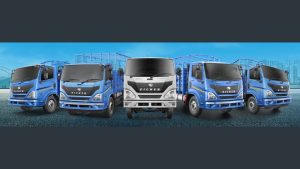
Renowned and acclaimed, commercial vehicle manufacturer of India, Ashok Leyland Ltd expects hydrogen-powered trucks and buses to be the future of commercial vehicles in just the span of five years at a time when commercial vehicle manufacturers are leaning toward the electrification of their fleet, natural gas-powered vehicles and other such platforms
N. Saravanan, chief technology officer of the Hinduja Group company, said in an interview that with the potential to reduce the tax on green hydrogen being considered, which will eliminate the import of the content along with a long haulage network and availability of green hydrogen could facilitate a positive business in this sector in the next five years.
Hydrogen-powered trucks meant for long haulage could lower the total cost of ownership (TCO) than compressed natural gas (CNG) variants if the rate of adoption and cost factor is at the sweet spot.
Also Read; Ashok Leyland 2820 6×2 MAV Details: Price & Spec Explained
“Investing in hydrogen as a fuel is important for us because, even compared to CNG, where we have some import content, hydrogen could be theoretically self-sufficient. We’ll maybe start with grey hydrogen, but green hydrogen can be produced with investments going on with multiple players.
We see hydrogen as a possibility and that possibility for us has two forms: IC engines and fuel cells. Priority-wise, we are looking at both technologies in parallel. However, we do believe that given Indian requirements, the comfort level with IC engines and the ecosystem, it may have a slight edge over fuel cells but how it pans out is anyone’s guess,” Saravanan said.
“In the medium- to long-term, if hydrogen becomes available at the right cost, it will start making commercial sense because, at that point, I would not be surprised if the government feels that hydrogen is a fuel that saves us foreign currency and, therefore, moves to lower tax on it. If that happens, it will trigger a certain amount of shift towards hydrogen,” he added.
Also Read: Altigreen’s First Retail Dealership In Bengaluru Now Open
The shift to hydrogen depends not only on the technological development of these vehicles but also on the readiness of the ecosystem. Most discussions seem to suggest that in the next three to five years, we’ll start seeing at least some amount of hydrogen production coming online, especially green hydrogen. I think in the next five years, we’ll start seeing at least the availability of hydrogen across certain long-distance corridors. Then, we’ll see vehicles that actually make sense,” Saravanan said.
Further, the country is focusing on producing 5 million tonnes of green hydrogen by 2030. As per the National Hydrogen Mission launched by Prime Minister Narendra Modi, the country plans on making India a hub for the production as well as export of green hydrogen. The aim of the policy is to help India meet decarbonisation targets and reduce its energy import cost of $160 billion, according to a report by NITI Aayog.
Thus, Ashok Leyland Ltd expects hydrogen-powered trucks and buses to be the future of commercial vehicles.
For more such articles and news, do join our 91Wheels Telegram and 91Trucks WhatsApp Group. You can now conduct discussions on your favourite ride, and much more using these links! Also, please do subscribe to our Youtube channel for video content on the latest from the world of trucks and buses. Further, connect with us on Facebook, Instagram, and Twitter for more about the automotive world!







